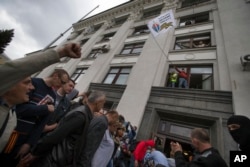There has been no breakthrough in the latest diplomatic attempt to implement a peace deal in eastern Ukraine, but observers say the so-called Minsk agreements are not "dead" yet.
In Paris on Thursday, foreign ministers from France, Germany, Russia and Ukraine — the so-called Normandy Format — tried to get the peace process back on track. The terms agreed to in Minsk during February of 2015 were not fully carried out by the deadline, which was the end of last year.
Analyst Jeff Rathke, Senior Fellow at the Center for Strategic and International Studies, said Friday both Moscow-backed separatists and Kyiv need to do their parts to move on with a permanent cease-fire and political reforms to break the stalemate.
"On the one hand, decisions have to be made by the Ukrainian authorities,” he said, “but most importantly is the need for the separatists backed by Russia to do their part, and so that remains as a problem, as progress is correspondingly slow and there [have] been no breakthroughs."
Rathke told VOA that Russia's intention in participating in the talks is trying to "find a way out of the sanctions" posed by the West.
A senior State Department official told VOA a full cease-fire and heavy-weapons withdrawal is needed for the implementation of political, economic and humanitarian aspects of Minsk — including voting in local elections.
‘No agreements reached’
After hours of talks, French foreign minister Jean-Marc Ayrault called for an April 30 deadline for a prisoner exchange in the Ukraine conflict, and for local elections to be held by the end of June in the Donbas region.
"We emphasized the importance of the creation and adoption of an electoral code by the Ukrainian government and the parliament in order to hold the local elections. We hope the elections will take place before the first half of 2016," he said.
But Ukrainian Foreign Minister Pavlo Klimkin said in a tweet that "no agreements were reached."
Klimkin said there needs to be more progress toward an endurable cease-fire, though, to create security on the ground for local elections. He said Russians were not ready to discuss anything in detail.
Germany’s foreign minister, Frank-Walter Steinmeier, expressed his frustration after the meeting.
He said in a statement that "sometimes I also have the impression that Moscow and Kyiv forgot how serious the situation is and what pressure we are under to implement Minsk faster, because otherwise our efforts risk losing their legitimacy and their credibility."
Suspicions regarding Russia
The United States has urged Russia-supported separatists to start an immediate heavy weapons withdrawal in eastern Ukraine. Washington also called for Kyiv to adopt political reforms.
"We recognize that political reform is important not just to the stability of their government but to the Ukrainian people, and we want to see that continue to progress," said State Department spokesman John Kirby on Thursday.
While top U.S. officials continue to voice support for the western-brokered Minsk peace deal, critics say it does not change Russia's illegal annexation of Crimea.
Former Deputy Assistant Secretary of the State Adam Ereli said that what the West saw in Russia's behavior in eastern Ukraine and Crimea was "the gradual erosion of established rules of international behavior, the respect for international boundaries, the intervention in internal conflicts, [and] the arming of separatist movements by hostile powers."
Ereli warned that Russian President Vladimir Putin has been utilizing all tools to undermine the western alliance.
"Clearly he's got his eyes on Moldova, clearly he's got his eyes on Eastern Europe," said Ereli of Putin, adding that "it's all part of an integrated plan."






